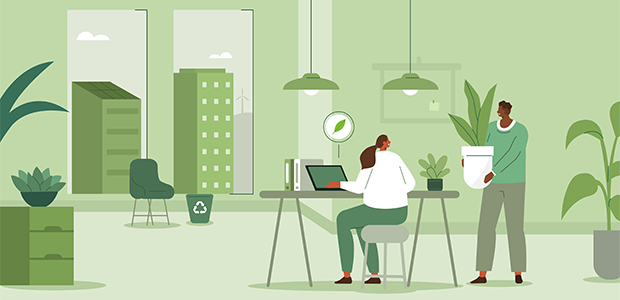
New flex operator creating workspaces that are better for people and the planet
We live in a world with an ever-increasing throwaway culture and the property sector is no stranger to waste. You might be shocked to discover that old or not fit-for-purpose office furniture is putting a cumulative burden on our landfills and ultimately on our environment – this contributes hugely to the 300 tonnes of waste sent daily to UK landfills and will ultimately create between 30-40% of an office building’s entire lifetime greenhouse gas emissions.
To develop a more sustainable future, my partners and I launched our flexible workspace company Koba to move away from the status quo and create high quality, sustainable workplaces based on evidence, not greenwash.
Working with our integrated delivery partner Cast Interiors and sustainability leader Drees & Sommer, we’ve produced a manifesto for creating incredible workspaces across the UK, backed up with tangible evidence every step of the way.
That’s why we are launching our first flex site, Koba @ 100 Barbirolli Square, in Manchester later this year, which will see a dynamic new centre delivered to the market. This allows us to mark the start of our journey with a scheme that enables us to implement our sustainability manifesto and show that we can create premium workplaces that are demonstrably better for individuals and the environment.
A key focus is on breathing new life into materials and office furniture through refurb or remanufacture with multiple lives, or next best use. This is part of our DNA and it’s our passionate philosophy to deliver multiple eco-friendly benefits through our workspaces, as well as contribute to a circular economy.
So, how does something often overlooked like office furniture become a key element of an attractive and functional workspace, whilst also being as environmentally friendly as possible? The first step is to refurbish through restoration with a step beyond this to completely remanufacture used furniture by overhauling it, including design and part replacement. It also means buying new furniture from UK-based companies who manufacture and assemble in this country whilst still using highly sustainable and recycled materials.
And why is this important? Because it hits several targets – it helps businesses meet sustainability requirements by reducing waste and easing the load on landfills, lowers environmental impact, reduces extra office spending costs and attracts talent increasingly seeking sustainable organisations to join. It also conserves resources on the raw materials needed for new products, with energy consumption also lowered compared with new furniture.
Our approach demonstrates an effective circular economy in action where products are kept in use for as long as possible, as well as supporting local industries who carry out the refurbishment and remanufacturing work.
Taking this one step further, a vital tool in the move towards a more sustainable future for offices is our pioneering Material Passports initiative, launched in partnership with leading platform Madaster. We introduced this to push the boundaries of sustainable practice and help transform the construction industry’s ability to reuse and repurpose materials via this groundbreaking new system. These work much like our own passport, a digital ID that follows the material and stores information on the travels it has made – we have selected Madaster to create these material passports, measure their circularity and importantly feedback this data to our customers.
We’re not just creating office spaces, we’re designing the future of work where sustainability is put right at the core. Each Koba workspace is constructed for future-focused landlords and occupiers who want to make a positive mark on the planet and its people.

